Indigenous
Why Should Indigenous Peoples Day Be Celebrated
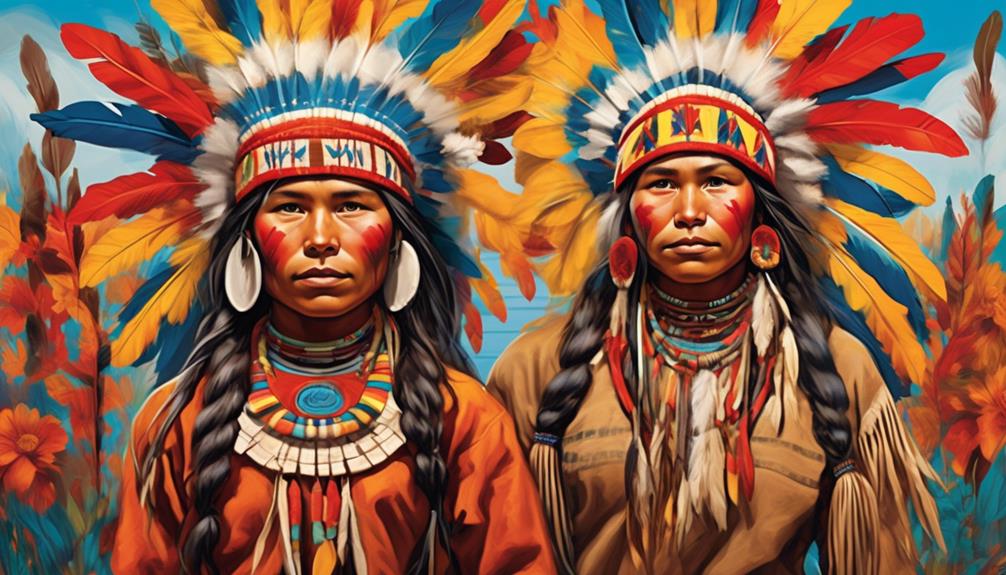
As the leaves change colors and the temperature drops, the annual conversation about Indigenous Peoples Day resurfaces. Many of us contemplate the significance of honoring indigenous peoples with a dedicated day, especially when it seems to clash with Columbus Day.
However, there are compelling reasons why this day should be recognized and celebrated. The impact of indigenous peoples on our history and culture is often overlooked, and their continued resilience and contributions shape our world in ways we may not fully appreciate.
Key Takeaways
- Recognition of historical injustices and the importance of acknowledging and addressing systemic injustices suffered by indigenous communities.
- Cultural preservation and revitalization as a way to maintain indigenous traditions, languages, art forms, and knowledge.
- Highlighting the contributions of indigenous peoples to society and the environment, particularly in terms of environmental stewardship and sustainable resource management.
- The need for recognition and representation of indigenous communities in decision-making processes, education, media, and cultural institutions, as well as support for indigenous businesses and entrepreneurs.
Historical Injustices and Reclamation
In commemorating Indigenous Peoples Day, we confront the historical injustices suffered by indigenous communities and seek to understand their ongoing efforts towards reclamation. The call for reparations is a crucial step in acknowledging and addressing the systemic injustices that have plagued indigenous peoples for centuries. It involves not only financial compensation but also the restoration of land, resources, and cultural heritage that were forcibly taken.
Healing is at the core of this process, recognizing the intergenerational trauma caused by colonization and the urgent need for holistic healing initiatives within indigenous communities.
Sovereignty is fundamental to the reclamation process, as it empowers indigenous nations to govern themselves, protect their lands, and preserve their traditions. The recognition of tribal sovereignty is a vital aspect of righting past wrongs and restoring dignity to indigenous peoples.
Empowerment goes hand in hand with sovereignty, as it entails providing indigenous communities with the tools, resources, and support needed to thrive independently.
In commemorating Indigenous Peoples Day, we must acknowledge the significance of reparations, healing, sovereignty, and empowerment in righting historical wrongs and supporting the ongoing efforts of indigenous communities towards reclamation.
Cultural Preservation and Revitalization
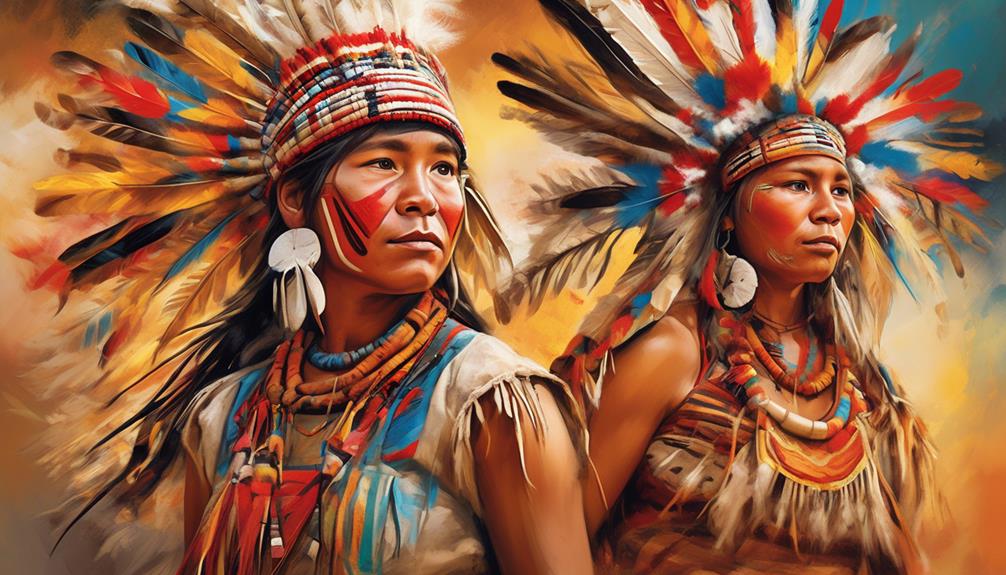
Cultural preservation and revitalization are essential components of Indigenous Peoples Day, embodying the resilience and vibrancy of indigenous traditions. Preserving traditions is crucial in maintaining the cultural identity and integrity of indigenous communities. This involves safeguarding languages, ceremonies, art forms, and traditional knowledge from being lost to time. Through the promotion of heritage revival, Indigenous Peoples Day celebrates the rich tapestry of indigenous cultures, recognizing the importance of passing down ancestral practices to future generations.
Indigenous Peoples Day serves as a platform for showcasing the beauty and depth of indigenous traditions, fostering a deep appreciation for the diverse cultural heritage that indigenous communities bring to the world. By actively promoting heritage revival, we honor the resilience and strength of indigenous peoples who've persevered despite historical injustices. This revitalization breathes new life into ancient customs, allowing them to thrive in the modern world while maintaining their authenticity.
In celebrating Indigenous Peoples Day, we actively support and participate in the preservation and revitalization of indigenous cultures, contributing to the perpetuation of these invaluable traditions.
Contributions to Society and Environment
Embracing the enduring legacy of indigenous cultural preservation and revitalization, we witness the profound impact of indigenous contributions to society and the environment. Indigenous peoples have long been at the forefront of environmental stewardship, employing sustainable practices that have a positive impact on ecosystems. Their deep connection to the land has fostered a unique understanding of the environment, leading to innovative conservation methods that benefit society as a whole. Additionally, indigenous communities have made significant societal impacts through their emphasis on communal well-being and interconnectedness.
| Environmental Stewardship | Societal Impact |
|---|---|
| Sustainable resource management | Preservation of traditional knowledge |
| Biodiversity conservation | Promotion of social harmony |
| Renewable energy initiatives | Advocacy for human rights |
| Climate change adaptation strategies | Fostering community resilience |
Through their environmental stewardship, indigenous peoples offer valuable insights into sustainable living practices, while their societal impact emphasizes the importance of unity and compassion. Recognizing and celebrating these contributions on Indigenous Peoples Day serves to honor their wisdom and fortify our collective responsibility towards the environment and each other.
Recognition and Representation
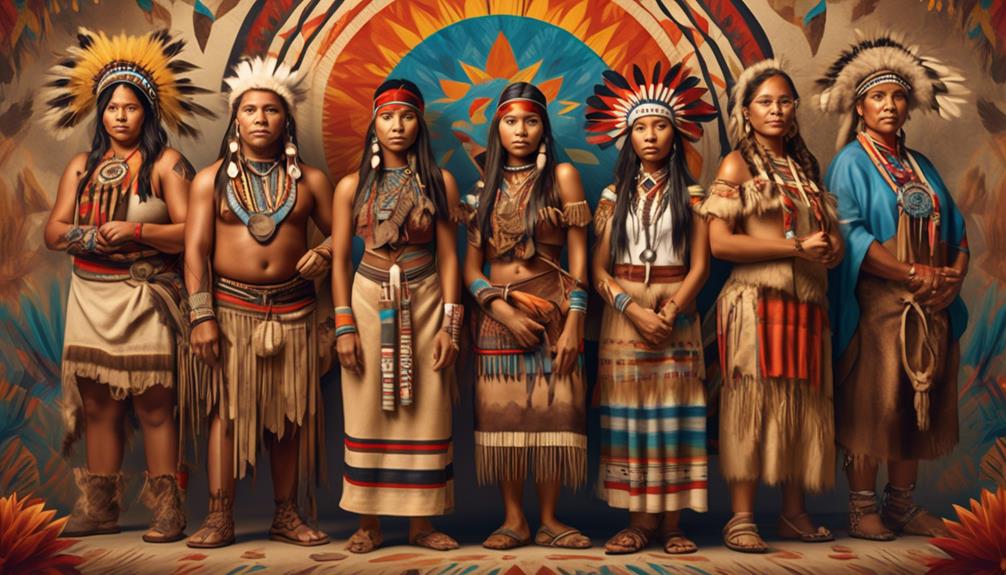
Indigenous peoples' rich heritage and diverse cultural expressions demand acknowledgment and authentic representation in all aspects of society. Recognition and representation are vital for the empowerment of indigenous communities. It's essential to ensure that indigenous voices aren't only heard but also actively included in decision-making processes that affect their lives. This includes representation in government, educational materials, cultural institutions, and media. By actively involving indigenous peoples in these areas, we can work towards a more inclusive society that values and respects their unique perspectives and contributions.
Moreover, authentic representation goes beyond just including indigenous peoples in a tokenistic manner. It means creating spaces for them to share their stories, preserve their traditions, and participate in shaping policies that impact their communities. This representation also extends to the economic sphere, where indigenous businesses and entrepreneurs should be supported and given opportunities to thrive.
Education and Awareness
We aim to foster a comprehensive understanding of indigenous history and culture through education and awareness initiatives. When it comes to raising awareness and integrating indigenous perspectives into mainstream education, it is essential to provide accurate and respectful representation. By incorporating indigenous knowledge, histories, and contemporary issues into school curricula, we can promote a more inclusive and accurate understanding of our shared history. This integration not only benefits indigenous students by validating their experiences and identities but also enriches the education of all students by providing a more holistic view of the world.
To further illustrate the importance of education and awareness initiatives, let's take a look at the following table highlighting the key benefits of these efforts:
| Benefits of Education and Awareness Initiatives |
|---|
| Fosters understanding of indigenous history and culture |
| Promotes respect and empathy towards indigenous communities |
| Counters stereotypes and misconceptions |
| Supports the preservation of indigenous languages and traditions |
| Empowers indigenous youth and promotes cultural pride |
Frequently Asked Questions
How Can Non-Indigenous People Support the Cultural Preservation and Revitalization Efforts of Indigenous Communities?
We can support indigenous communities by actively listening to their needs and amplifying their voices.
Engaging in cultural awareness events and educational initiatives helps to foster understanding and respect.
Donating to indigenous organizations and participating in community-led initiatives are also impactful ways of supporting these communities.
What Are Some Specific Ways That Indigenous Peoples Have Contributed to Environmental Conservation and Sustainable Practices?
Indigenous innovation has shaped environmental stewardship in remarkable ways. Their sustainable practices, rooted in ancient wisdom, offer valuable lessons for modern conservation efforts.
Their deep connection to the land and innovative technologies have sustained ecosystems for generations. From traditional farming techniques to resource management, indigenous peoples have been pioneers in environmental preservation.
Their contributions inspire new approaches to sustainability and serve as a testament to the power of indigenous knowledge in safeguarding our planet.
What Does Meaningful Recognition and Representation of Indigenous Peoples Look Like in Modern Society?
Meaningful representation of indigenous peoples in modern society involves giving them a voice in decision-making processes, acknowledging their cultural practices, and supporting their empowerment.
This includes actively involving indigenous leaders in policy discussions, creating platforms for indigenous storytelling and art, and respecting their land rights.
Indigenous empowerment means recognizing their unique contributions and ensuring that their voices are heard and respected in all aspects of society.
How Can Educational Institutions Better Incorporate Indigenous History and Perspectives Into Their Curricula?
Incorporating indigenous perspectives and decolonizing education require deep curriculum reform.
We can integrate indigenous knowledge by centering it in our learning materials and acknowledging its significance.
Educational institutions must actively seek out indigenous voices and histories to ensure a more comprehensive and accurate portrayal.
What Are Some Lesser-Known Historical Injustices That Indigenous Peoples Have Faced and Are Still Facing Today?
Historical injustices against indigenous peoples are often overlooked. Land rights violations and forced assimilation have plagued indigenous communities for centuries.
Despite this, indigenous resilience shines through in the fight for cultural preservation and recognition.
Today, many still face challenges such as lack of access to resources and systemic discrimination.
Understanding these lesser-known struggles is crucial for acknowledging the ongoing impact of historical injustices on indigenous peoples and supporting their rights and contributions.
Conclusion
In conclusion, celebrating Indigenous Peoples Day isn't just about recognizing historical injustices, but also about honoring their contributions to our society and environment.
It's a chance for us to learn, appreciate, and embrace the rich cultures and traditions of indigenous communities.
Let's continue to stand in solidarity with them and ensure their voices are heard, because together, we can paint a more vibrant and inclusive world.
Mary is a passionate writer who brings creativity and a fresh perspective to our team. Her words have the power to captivate and inspire, making her an essential contributor to our content. Mary’s commitment to storytelling and dedication to promoting Indigenous culture ensures that her work touches the hearts of our readers. We’re fortunate to have her as part of our team.
Indigenous
How to Make a Difference for Missing and Murdered Indigenous Women

Analyzing the extensive data and heartbreaking stories surrounding missing and murdered Indigenous women, it is clear that urgent action is required.
However, simply acknowledging the problem is not enough. There are tangible steps we can take to make a difference, from understanding the root causes of this crisis to actively supporting Indigenous-led initiatives.
But how exactly can we contribute to meaningful change? Let's explore some practical ways we can address this pressing issue and truly make an impact.
Key Takeaways
- Acknowledge the historical and systemic factors contributing to the crisis of missing and murdered Indigenous women.
- Raise awareness about the realities facing Indigenous women through community events and educational initiatives.
- Advocate for policy reforms that prioritize the safety and well-being of Indigenous women and girls.
- Support Indigenous-led initiatives by engaging with local communities, fostering partnerships, and integrating cultural traditions and knowledge.
Understanding the Issue
Understanding the issue of missing and murdered Indigenous women requires acknowledging the historical and systemic factors that have contributed to this ongoing crisis. From an Indigenous perspective, the roots of this crisis run deep, intertwined with a legacy of colonization, marginalization, and systemic injustice. For centuries, Indigenous women have faced disproportionately high rates of violence, often at the hands of non-Indigenous individuals, and their cases have been met with indifference from law enforcement and the justice system.
Systemic injustice has perpetuated this crisis, with failures in reporting, investigating, and prosecuting cases of missing and murdered Indigenous women. This has led to a pervasive sense of mistrust and fear within Indigenous communities, further exacerbating the issue.
It's crucial to recognize that addressing this crisis requires a comprehensive understanding of the complex historical and contemporary factors at play.
Raising Awareness

Raising awareness about the crisis of missing and murdered Indigenous women is crucial in mobilizing support and action to address this urgent issue. To achieve this, we must engage our communities and educate them about the realities facing Indigenous women.
Here are some key strategies for raising awareness:
- Community Engagement
- Organize community events, such as panel discussions or workshops, to bring people together to learn and discuss the issue.
- Collaborate with local Indigenous organizations and leaders to ensure that the awareness efforts are culturally relevant and respectful.
- Education and Allyship
- Implement educational initiatives in schools and workplaces to foster a deeper understanding of the challenges Indigenous women face.
- Encourage individuals to become allies by promoting cultural sensitivity and advocating for the rights and safety of Indigenous women.
Advocating for Policy Changes
To make a lasting impact in addressing the crisis of missing and murdered Indigenous women, we must now focus our efforts on advocating for policy changes that will bring about tangible and meaningful solutions.
Policy reform is crucial in addressing the systemic issues that contribute to the high rates of violence against Indigenous women. Through legislative advocacy, we can push for the implementation of policies that prioritize the safety and well-being of Indigenous women and girls.
Advocating for policy changes involves engaging with lawmakers and decision-makers to push for reforms that address the root causes of violence against Indigenous women. This can include advocating for increased funding for law enforcement agencies to improve their response to missing persons cases involving Indigenous women, as well as pushing for the implementation of culturally sensitive support services for Indigenous communities.
Additionally, advocating for policy changes also entails working towards the incorporation of Indigenous perspectives and traditional knowledge into the development of laws and policies that directly impact Indigenous women.
Supporting Indigenous-Led Initiatives
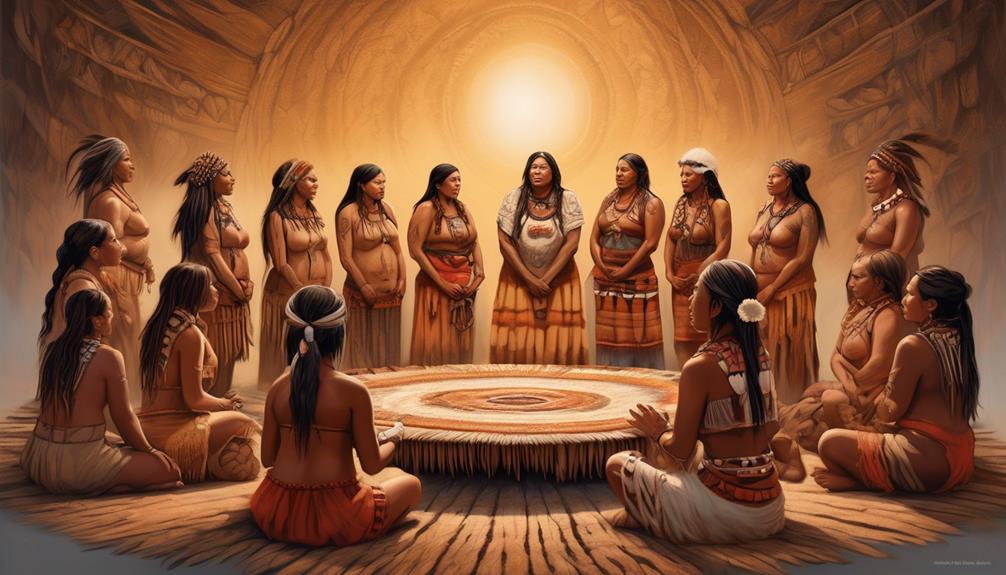
We are committed to actively supporting Indigenous-led initiatives aimed at addressing the unique challenges faced by Indigenous women and girls. It's crucial that we prioritize community involvement and cultural sensitivity in our approach to supporting these initiatives.
- Community Involvement
- Engage with local Indigenous communities to understand their specific needs and priorities.
- Foster meaningful partnerships with grassroots organizations and community leaders to ensure that initiatives are truly reflective of the community's desires and aspirations.
- Cultural Sensitivity
- Integrate cultural traditions, practices, and knowledge into the design and implementation of initiatives, respecting the diversity and richness of Indigenous cultures.
- Provide opportunities for Indigenous women and girls to lead and shape the initiatives, honoring their voices and lived experiences.
Taking Direct Action
Let's roll up our sleeves and start taking direct action to address the systemic issues contributing to the disappearances and murders of Indigenous women and girls. Community organizing and grassroots activism are powerful tools that can bring about significant change.
By organizing within our communities, we can advocate for policy reforms, raise awareness, and provide support to those affected. One way to take direct action is to organize community forums or events where Indigenous women and their families can share their experiences and voice their concerns. These gatherings can serve as a platform for community members to come together, offer support, and strategize for change.
Grassroots activism involves mobilizing individuals at the local level to collectively work towards a common goal. This can include organizing marches, creating educational materials, and engaging in outreach efforts to raise awareness about the plight of missing and murdered Indigenous women.
Frequently Asked Questions
What Are Some Common Barriers That Prevent Indigenous Communities From Accessing Justice for Missing and Murdered Indigenous Women?
Barriers preventing indigenous communities from accessing justice for missing and murdered indigenous women include:
- Lack of cultural sensitivity in the justice system
- Inadequate community support
- Insufficient advocacy
These challenges can hinder the reporting of cases and the pursuit of justice.
Our efforts must address these barriers by:
- Promoting cultural awareness
- Providing robust community support
- Advocating for systemic change
This is necessary to ensure that indigenous women receive the justice and support they deserve.
How Can Individuals Support Indigenous-Led Initiatives in a Culturally Respectful and Meaningful Way?
We can support indigenous-led initiatives in a culturally respectful and meaningful way by building supportive partnerships and enhancing cultural competency.
This involves actively listening to indigenous communities, respecting their leadership, and learning about their cultural traditions and values.
What Are Some Effective Ways to Take Direct Action in Addressing the Issue of Missing and Murdered Indigenous Women?
When addressing the issue of missing and murdered indigenous women, direct action is crucial.
Engaging in community empowerment initiatives and supporting indigenous-led organizations are effective ways to make a difference.
By amplifying indigenous voices and advocating for systemic change, we can work towards justice.
As the saying goes, 'actions speak louder than words,' so let's take direct action and stand in solidarity with indigenous communities to address this critical issue.
How Can Non-Indigenous Individuals Advocate for Policy Changes That Support and Protect Indigenous Women and Girls?
We can advocate for policy changes that support and protect indigenous women and girls by:
- Engaging with local and national government representatives
- Joining or supporting organizations that focus on indigenous rights
- Participating in advocacy campaigns
Community engagement is crucial for raising awareness and mobilizing support for policy changes.
What Are Some Important Cultural Considerations to Keep in Mind When Raising Awareness About Missing and Murdered Indigenous Women Within Non-Indigenous Communities?
When it comes to raising awareness about missing and murdered indigenous women within non-indigenous communities, cultural sensitivity is paramount.
It's pivotal to understand and respect the cultural nuances and traditions of indigenous communities.
Engaging with the community in a respectful and inclusive manner is crucial for effective advocacy.
Conclusion
In conclusion, it's crucial that we all come together to address the crisis of missing and murdered indigenous women.
By raising awareness, advocating for policy changes, and supporting indigenous-led initiatives, we can make a real difference.
Let's not just talk the talk, but also walk the walk and stand up for those who've been marginalized and forgotten.
It's time to put our money where our mouth is and take meaningful action to bring about change.
Mary is a passionate writer who brings creativity and a fresh perspective to our team. Her words have the power to captivate and inspire, making her an essential contributor to our content. Mary’s commitment to storytelling and dedication to promoting Indigenous culture ensures that her work touches the hearts of our readers. We’re fortunate to have her as part of our team.
Indigenous
Which of the Following Are Well Known Indigenous Writers?
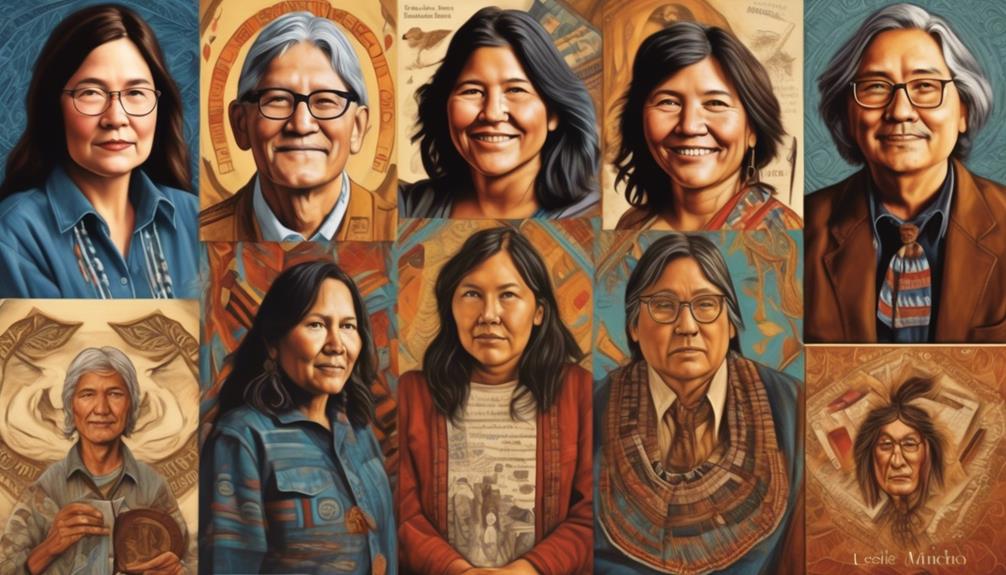
Who are some well-known American authors who have greatly influenced the world of literature? When we think about the realm of written works, names like Sherman Alexie, Louise Erdrich, Leslie Marmon Silko, Thomas King, and Oodgeroo Noonuccal often stand out.
However, are these the only indigenous writers we should be familiar with? Let's explore and uncover the rich tapestry of indigenous writers and their impactful contributions to the literary world.
Key Takeaways
- Sherman Alexie, Louise Erdrich, Leslie Marmon Silko, Thomas King are well-known indigenous writers.
- These writers explore contemporary indigenous experiences, shedding light on the impact of colonization on indigenous communities and challenging stereotypical portrayals of indigenous people.
- They skillfully weave storytelling tradition into modern narratives and incorporate indigenous storytelling traditions into contemporary literature.
- Oodgeroo Noonuccal is a significant figure in Indigenous literature, pioneering the inclusion of Aboriginal issues in Australian literature and advocating for social and political change.
Sherman Alexie
Sherman Alexie, a prolific and influential Native American writer, has garnered widespread acclaim for his poignant and unapologetic exploration of contemporary indigenous experiences. His works delve deeply into the complexities of cultural identity and the impact of colonization on indigenous communities. Through his writings, Alexie adeptly portrays the struggles and triumphs of Native Americans, offering a vivid portrayal of the challenges they face in a rapidly evolving world.
Alexie's contribution to indigenous literature is profound, as he skillfully weaves the storytelling tradition of his people into modern narratives, bridging the gap between the past and the present. His work serves as a powerful testament to the resilience and enduring spirit of indigenous cultures, while also shedding light on the harsh realities they confront in the wake of historical injustices.
Louise Erdrich
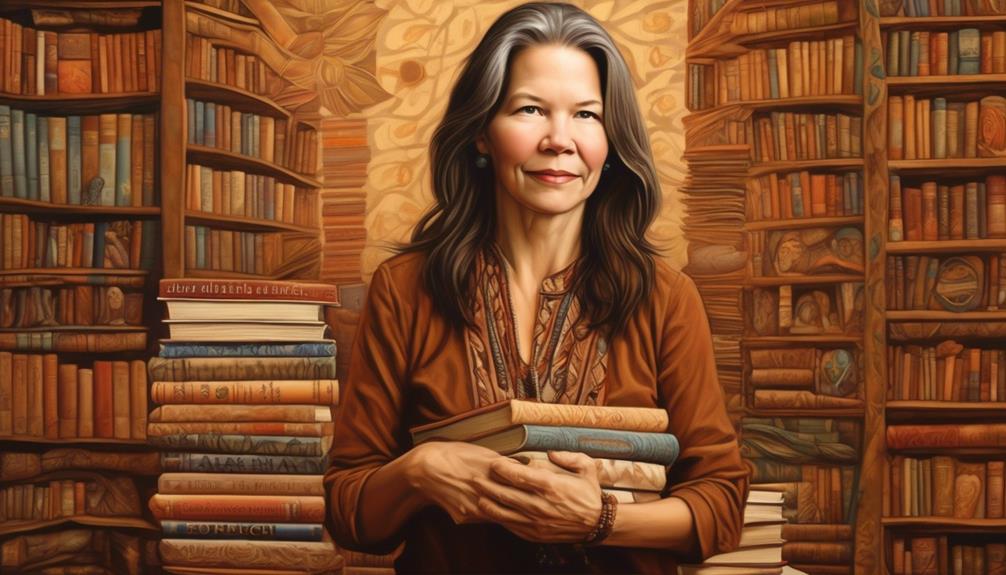
Louise Erdrich, an accomplished and celebrated indigenous author, has established herself as a prominent voice in contemporary Native American literature through her deeply evocative storytelling and insightful exploration of the complexities of indigenous experiences. Erdrich, a member of the Turtle Mountain Band of Chippewa Indians, has contributed significantly to the exploration of Ojibwe culture in her works, showcasing a deep commitment to cultural preservation and the portrayal of Native American resilience.
Erdrich's novels, such as 'Love Medicine' and 'The Round House,' delve into multigenerational storytelling, weaving together narratives that span across time to illuminate the depth and richness of indigenous heritage. Her writing exemplifies the power of Indigenous storytelling in conveying the intricate tapestry of Native American life, connecting past, present, and future in a way that resonates with readers on a profound level.
Through her poignant and masterful prose, Erdrich sheds light on the enduring spirit of Native American communities, offering a window into their experiences, struggles, and triumphs. Her contributions to Native American literature are invaluable, as she continues to enrich the literary landscape with her insightful and compelling portrayals of indigenous life.
Leslie Marmon Silko
Leslie Marmon Silko, another influential Indigenous author, similarly illuminates the complexities of Native American experiences through her evocative storytelling and profound exploration of cultural heritage. Silko's writing style is characterized by its rich oral tradition, blending traditional storytelling with contemporary narrative techniques. Her works, such as 'Ceremony' and 'Almanac of the Dead,' delve into the spiritual and cultural foundations of Indigenous communities, addressing themes of identity, tradition, and the impact of colonization on Native peoples.
Silko's profound exploration of cultural heritage is evident in her meticulous portrayal of traditional Laguna Pueblo beliefs and practices, infusing her narratives with the essence of Indigenous spirituality and interconnectedness with the land. Through her writing, Silko not only preserves the legacy of her people but also challenges mainstream literary norms, offering a unique perspective that intertwines history, myth, and personal experience.
Her works not only serve as a literary expression but also as a means of cultural preservation, capturing the essence of Indigenous traditions and worldviews. Silko's writings continue to be instrumental in broadening the understanding of Indigenous experiences and challenging the conventional literary canon.
Thomas King
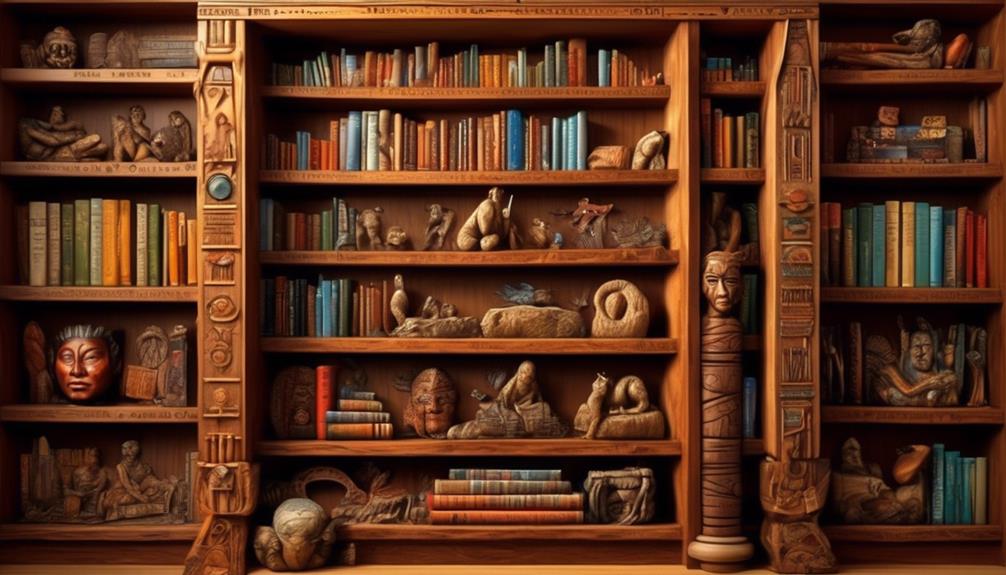
Renowned for his incisive wit and astute observations, Thomas King, a distinguished Indigenous writer, is celebrated for his thought-provoking narratives that skillfully navigate the complexities of Indigenous identity and history. King's works delve into the intricate layers of cultural identity, intertwining storytelling traditions with a deep exploration of Indigenous resistance in literature. His writing often showcases Indigenous humor as a powerful tool for addressing colonialism and environmentalism.
King's exploration of cultural identity is a central theme in his writings. He adeptly examines the nuances of Indigenous identity, challenging stereotypical portrayals and presenting a more authentic representation through his characters and narratives. His works navigate the impact of historical and contemporary forces on Indigenous communities, offering a profound understanding of the complexities of Indigenous experiences.
Moreover, King's incorporation of Indigenous storytelling traditions into his works serves to preserve and honor Indigenous oral traditions, weaving them into the fabric of contemporary literature. His narratives reflect a deep respect for the power of storytelling in Indigenous cultures, emphasizing its role in preserving history and fostering resilience in the face of adversity.
In addressing Indigenous resistance in literature, King confronts the legacies of colonialism, advocating for Indigenous voices to be heard and respected. Furthermore, his works often carry strong environmentalist messages, drawing attention to the interconnectedness of Indigenous communities with the natural world and the impact of environmental degradation on their lives.
Oodgeroo Noonuccal
A significant figure in Indigenous literature, Oodgeroo Noonuccal adeptly weaves together her experiences and cultural heritage to create impactful narratives that resonate with readers. Exploring Oodgeroo Noonuccal's impact on Indigenous literature reveals her pioneering role in bringing Aboriginal issues to the forefront of Australian literature. Her works, including 'We Are Going' and 'Stradbroke Dreamtime,' challenge the dominant narratives and stereotypes about Indigenous people, offering a counter-narrative that portrays the richness and complexity of Aboriginal life and culture.
Analyzing the themes in Oodgeroo Noonuccal's writings uncovers her deep commitment to social justice, the environment, and the preservation of Indigenous traditions. Her poetry often addresses the themes of dispossession, discrimination, and the importance of connection to the land. Noonuccal's writing also celebrates the resilience and strength of Indigenous communities, emphasizing the need for reconciliation and understanding between Indigenous and non-Indigenous Australians.
Oodgeroo Noonuccal's impact extends beyond her literary contributions; she was also a prominent activist for Aboriginal rights, using her platform as a writer to advocate for social and political change. Through her writing and activism, Noonuccal left an indelible mark on Indigenous literature, paving the way for future generations of Indigenous writers to share their stories and perspectives.
Frequently Asked Questions
What Specific Themes or Topics Do These Indigenous Writers Often Address in Their Work?
In their work, indigenous writers often explore themes related to cultural identity, delving into the complexities and nuances of their heritage.
Additionally, they frequently address the representation of historical trauma, shedding light on the impact of colonization and historical injustices on indigenous communities.
Through their writing, these authors provide a profound and insightful perspective on these themes, contributing to a deeper understanding of indigenous experiences and history.
How Have These Writers Influenced the Portrayal of Indigenous People in Literature and Popular Culture?
Indigenous writers have had a profound influence on the portrayal of indigenous people in literature and popular culture. Their work has had a significant cultural impact, challenging stereotypes and providing authentic representations of indigenous communities.
Through their storytelling, they've reshaped the narrative around indigenous experiences, shedding light on important issues and promoting understanding and empathy. Their influence has been instrumental in shaping a more accurate and respectful portrayal of indigenous peoples in various forms of media.
What Awards or Recognition Have These Writers Received for Their Work?
When it comes to literary accomplishments and cultural impact, these writers have received numerous awards and recognition for their work. Their contributions have been acknowledged through prestigious literary prizes, such as the Pulitzer, National Book Award, and the Nobel Prize in Literature.
Their work hasn't only garnered critical acclaim but has also significantly influenced the portrayal of indigenous people in literature and popular culture, leaving a lasting legacy for future generations.
Are There Any Common Writing Styles or Techniques That These Indigenous Writers Share?
Exploring indigenous storytelling and cultural preservation, we've found that Indigenous writers often share a deep connection to their heritage, infusing their work with unique perspectives and storytelling techniques.
Their writing styles frequently incorporate oral storytelling traditions, vivid imagery, and a focus on community and nature. These elements not only enrich their narratives but also serve as a means of preserving and sharing their cultural heritage with a global audience.
What Impact Have These Writers Had on the Indigenous Literary Community and Beyond?
Cultural representation and indigenous identity have been significantly influenced by these writers. Their impact on global literature and social justice is profound.
Through their works, they've brought attention to indigenous experiences and challenges, amplifying their voices and shedding light on important societal issues.
Their influence extends beyond the indigenous literary community, shaping conversations and perspectives on a global scale, and inspiring greater recognition and respect for indigenous cultures and histories.
Conclusion
In conclusion, the well-known indigenous writers mentioned in the article have each made significant contributions to literature, bringing attention to the experiences and perspectives of Indigenous peoples. Their work has shed light on important issues and has helped to preserve and celebrate indigenous culture.
These writers have played a crucial role in shaping the literary landscape, and their impact will continue to be felt for generations to come.
Mary is a passionate writer who brings creativity and a fresh perspective to our team. Her words have the power to captivate and inspire, making her an essential contributor to our content. Mary’s commitment to storytelling and dedication to promoting Indigenous culture ensures that her work touches the hearts of our readers. We’re fortunate to have her as part of our team.
Indigenous
What Ancient Indigenous People Lived in Central America?
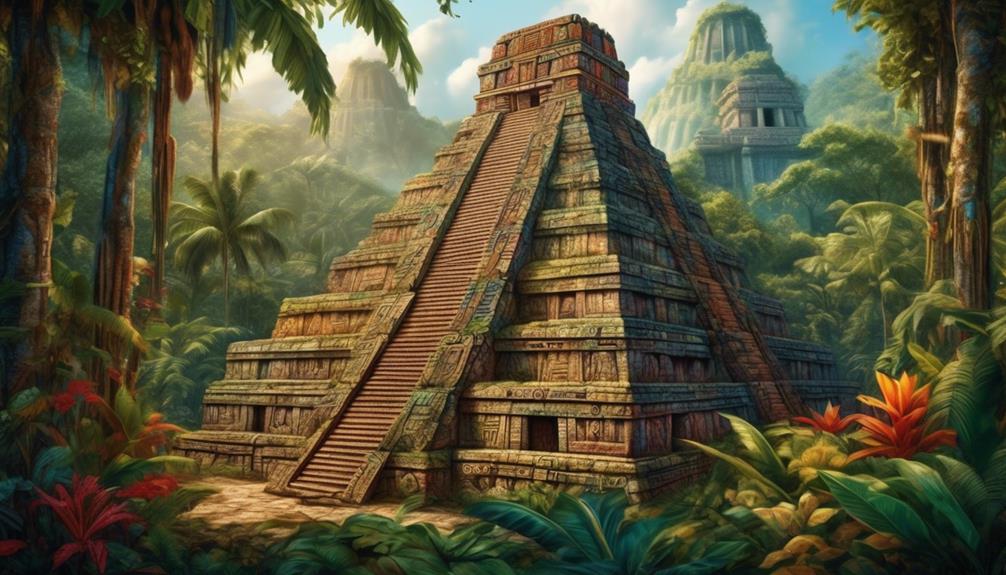
When we think of Central America, we often imagine lush rainforests and ancient civilizations. Who were the people who thrived in this region, leaving behind legacies that continue to intrigue us today?
The answer lies in the rich tapestry of indigenous cultures that called Central America home. From the enigmatic Olmec to the awe-inspiring Maya, and the majestic Aztec to the resilient Taino, the ancient inhabitants of Central America have left an indelible mark on history.
But what were their societies like? What were their achievements and beliefs? Join us as we uncover the fascinating stories of these remarkable civilizations and their enduring influence on the world.
Key Takeaways
- The Olmec civilization was the earliest civilization in Central America and thrived from approximately 1400 BCE to 400 BCE. They were known for their distinctive art style, monumental architecture, and religious practices.
- The Maya civilization flourished from 2000 BC to 1500 AD and had impressive mastery of astronomy and mathematics. They developed a complex calendar system, built impressive cities with pyramids and palaces, and practiced human sacrifice in religious rituals.
- The Zapotec civilization, which flourished from 600 BC to 800 AD, was distinguished as innovators in architecture and urban planning. They developed a system of writing using hieroglyphs, constructed efficient drainage systems, and engaged in agriculture.
- The Aztec civilization emerged as powerful empire builders in Mesoamerica in the 14th century AD. They established a capital city, Tenochtitlan, developed sophisticated agricultural techniques, constructed awe-inspiring pyramids and temples, and practiced human sacrifice as part of their religious beliefs.
Olmec: Central America's Earliest Civilization
The Olmec civilization, often considered the earliest civilization in Central America, has intrigued researchers and archaeologists for decades due to its enigmatic cultural and monumental achievements. The Olmec people, who thrived from approximately 1400 BCE to 400 BCE, exerted significant cultural influences on subsequent Mesoamerican civilizations. Their legacy is evident in various aspects, such as their distinctive art style, monumental architecture, and religious practices, which laid the foundation for the development of later societies in the region.
One of the most remarkable cultural influences of the Olmec civilization is their art, characterized by the creation of colossal stone heads and intricate jade figurines. These masterpieces not only reflect the Olmec's advanced sculpting techniques but also provide insights into their religious beliefs and societal structure.
Additionally, the Olmec's architectural achievements, such as the construction of ceremonial centers and earthen mounds, demonstrate their sophisticated understanding of urban planning and ceremonial spaces, influencing subsequent Mesoamerican societies.
Furthermore, the Olmec's religious practices, including the worship of deities associated with fertility and rain, had a lasting impact on the spiritual beliefs of later civilizations, illustrating the enduring cultural legacy of the Olmec civilization in Central America.
Maya: Masters of Astronomy and Mathematics
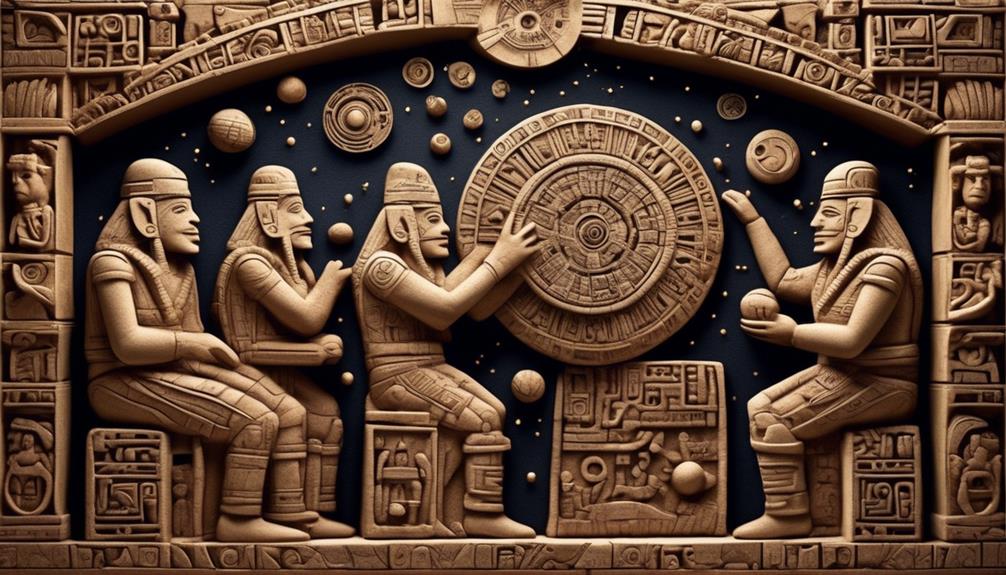
During our research, we discovered the impressive mastery of astronomy and mathematics exhibited by the ancient Maya civilization. The Maya people made significant contributions to Mesoamerican achievements through their Indigenous knowledge and skills in these fields. Their understanding of astronomy was evident in the precise alignment of their temples and observatories with celestial events, such as solstices and equinoxes. Additionally, the Maya developed a complex calendar system that incorporated both solar and ritual cycles, showcasing their advanced mathematical abilities. Below is a table highlighting some key aspects of the Maya's astronomical and mathematical achievements:
| Aspect | Description | Example |
|---|---|---|
| Astronomy | Precise alignment of structures with celestial events, development of a sophisticated calendar system | Temples and observatories aligned with solstices |
| Mathematics | Complex numerical system, including the concept of zero, advanced understanding of geometry and mathematical calculations | Use of a base-20 numerical system, accurate mathematical calculations |
The Maya's expertise in astronomy and mathematics not only facilitated their everyday lives but also played a crucial role in their religious and ceremonial practices. Their knowledge and skills continue to fascinate and inspire modern scholars and enthusiasts, shedding light on the intellectual achievements of ancient Indigenous civilizations.
Zapotec: Innovators in Architecture and Urban Planning
Building on the remarkable achievements of the Maya in astronomy and mathematics, the Zapotec civilization distinguished itself as innovators in architecture and urban planning in ancient Central America. Zapotec urban design was characterized by advanced architectural achievements, which showcased their profound understanding of engineering and urban layout.
One of the most notable examples of their architectural prowess is the ancient city of Monte Albán. This urban center, established around 500 BCE, featured impressive structures such as the Great Plaza, the Ball Court, and the Palace. The layout of Monte Albán was meticulously planned, with complex building designs and precise orientation to celestial events, reflecting the Zapotec's deep knowledge of astronomy and its integration into urban planning.
Furthermore, the Zapotec people constructed efficient drainage systems and terraces for agriculture, demonstrating their practical understanding of landscape utilization and environmental adaptation. Their architectural and urban planning innovations not only contributed to the functionality and sustainability of their cities but also reflected their cultural and social values.
The Zapotec's legacy in architecture and urban planning continues to fascinate and inspire modern-day urban designers and architects, emphasizing the enduring impact of their ancient wisdom and innovation.
Aztec: Legacy of Powerful Empire Builders
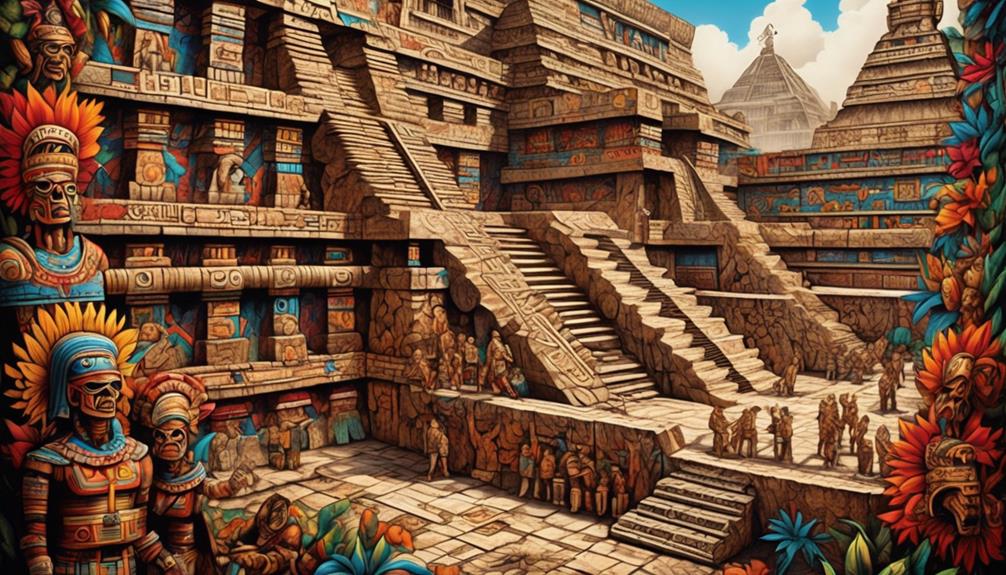
Emerging as formidable empire builders in the heart of Mesoamerica, the Aztec civilization left an indelible mark on the region's history and culture.
The Aztecs, also known as Mexica, created a powerful empire through a combination of military conquest, strategic alliances, and a well-organized system of governance.
Their legacy is characterized by a complex society, intricate religious beliefs, and monumental architectural achievements.
The Aztecs established a capital city, Tenochtitlan, on an island in Lake Texcoco, which became the center of their vast empire.
They developed sophisticated agricultural techniques, built intricate irrigation systems, and constructed awe-inspiring pyramids and temples.
Their influence extended to art, literature, and a complex calendar system that reflected their advanced understanding of astronomy.
Despite the Aztec Empire's eventual fall to Spanish conquest, their legacy continues to resonate in modern-day Mexico and beyond, shaping the cultural identity of the region.
The Aztecs' impact as empire builders is a testament to their enduring power and influence, leaving a lasting imprint on the history of Central America.
Taino: Indigenous Inhabitants of the Caribbean Islands
The legacy of powerful empire builders in Central America, such as the Aztec civilization, sets the stage for understanding the rich cultural heritage of the Taino, indigenous inhabitants of the Caribbean Islands. The Taino culture was deeply rooted in their traditional practices, including agriculture, fishing, and intricate craftwork. They were skilled in cultivating cassava, corn, and sweet potatoes, and their artistic expressions were evident in pottery, jewelry, and ceremonial objects.
Today, many Taino descendants continue to honor and preserve their cultural heritage. Efforts to revive traditional Taino practices, language, and spirituality are underway, contributing to the resurgence of Taino identity. Additionally, there are ongoing initiatives to protect and conserve Taino archaeological sites, artifacts, and historical records, ensuring that their legacy endures for future generations.
Understanding the Taino culture offers a glimpse into the rich tapestry of indigenous peoples who shaped the Americas. Their resilience, traditions, and contributions to art and agriculture continue to inspire admiration and respect. As we delve deeper into the Taino's history and contemporary preservation efforts, we gain a profound appreciation for their enduring legacy.
Frequently Asked Questions
What Were the Religious Beliefs and Practices of the Olmec Civilization?
We studied the religious practices of the Olmec civilization, and their beliefs were intricately intertwined with their art.
The Olmecs revered deities associated with fertility, rain, and agriculture, as evidenced by their monumental sculptures and ceremonial objects.
Rituals, including bloodletting and human sacrifice, were central to their religious ceremonies.
The Olmec art also depicted shamanic transformations, reflecting their spiritual connection to the natural world.
How Did the Maya Society Govern Itself and What Was the Political Structure Like?
We've delved into the fascinating structure of Maya governance and political organization, shedding light on their hierarchical society.
The Mayans governed themselves through a complex system of city-states, each ruled by a divine king. These rulers held significant power and authority, overseeing religious ceremonies and trade.
The political structure was marked by social stratification, with nobles and priests holding key positions.
This intricate system provides deep insights into Maya civilization's sophisticated organization.
What Were the Major Achievements in Art and Culture of the Zapotec Civilization?
Artistic achievements of the Zapotec civilization included intricate pottery, impressive stone carvings, and elaborate architecture, showcasing their advanced craftsmanship and artistic expression.
Their cultural influence extended to their unique writing system, religious practices, and complex calendar system, which impacted subsequent Mesoamerican cultures.
The Zapotecs' artistic and cultural contributions are a testament to their sophisticated society and enduring legacy in Central America.
What Were the Main Factors That Led to the Decline of the Aztec Empire?
We often overlook the interconnectedness of economic and social factors when examining the decline of the Aztec Empire.
Various historical accounts highlight the impact of internal strife and external pressures on the empire's stability.
Economic strain from continuous expansion and social unrest due to oppressive governance were pivotal in the empire's downfall.
Exploring these multifaceted influences provides a comprehensive understanding of the complex forces at play during this significant period in Central American history.
What Were the Traditional Customs and Daily Life of the Taino People on the Caribbean Islands?
In discussing Taino customs, daily life, agriculture, and social structure, it's vital to understand the rich cultural traditions and societal organization of this indigenous group.
Taino customs encompassed a deep connection to nature, reflected in their agricultural practices and spiritual beliefs.
Daily life revolved around communal activities and a well-defined social structure.
This evidence-based perspective provides a comprehensive understanding of the Taino people's way of life in the Caribbean islands.
Conclusion
In conclusion, the ancient indigenous people of Central America, including the Olmec, Maya, Zapotec, Aztec, and Taino, left behind a rich cultural legacy that continues to fascinate and inspire us today.
Through thorough research and evidence-based analysis, we can appreciate the depth and complexity of their achievements in astronomy, mathematics, architecture, urban planning, and empire building.
The truth of their contributions adds an important cultural context to our understanding of the history of Central America.
Mary is a passionate writer who brings creativity and a fresh perspective to our team. Her words have the power to captivate and inspire, making her an essential contributor to our content. Mary’s commitment to storytelling and dedication to promoting Indigenous culture ensures that her work touches the hearts of our readers. We’re fortunate to have her as part of our team.
-

 Culture2 weeks ago
Culture2 weeks agoUnderstanding Aboriginal Totem Significance
-
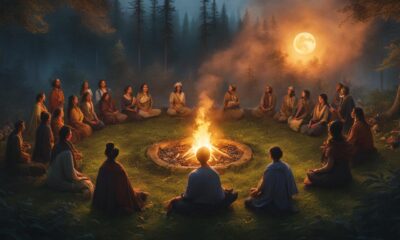
 Torres Strait Islanders4 hours ago
Torres Strait Islanders4 hours agoSacred Healing: Discovering Indigenous Health Secrets
-

 Torres Strait Islanders5 hours ago
Torres Strait Islanders5 hours agoJourney to Wellness: Indigenous Health Product Guide
-

 Torres Strait Islanders5 hours ago
Torres Strait Islanders5 hours agoCultural Vitality: Indigenous Health Tips
-

 Torres Strait Islanders4 hours ago
Torres Strait Islanders4 hours agoEmbrace Indigenous Wisdom: Top Well-Being Products
-

 Torres Strait Islanders4 hours ago
Torres Strait Islanders4 hours agoHolistic Health: Indigenous Wellness Explored
-

 Torres Strait Islanders5 hours ago
Torres Strait Islanders5 hours agoNature’s Wisdom: Indigenous Well-Being Remedies
-

 Torres Strait Islanders4 hours ago
Torres Strait Islanders4 hours agoIndigenous Health Products Guide for Wellness












